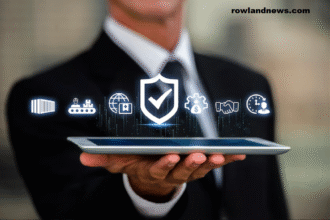Securing Valuable Works and Inventions in the New Virtual Frontier
Imagine dedicating months or even years to developing a novel concept, composing a musical work, writing a novel, or engineering innovative software only for it to be copied, distributed, or utilized without consent. Unfortunately, this nightmare scenario has become all too common for millions of creators, entrepreneurs, and enterprises in our digital era.
With content spreading at lightning speeds online, safeguarding intellectual property and digital assets is more critical and challenging than ever before. Thankfully, blockchain technology is stepping up to transform this troubling narrative.
From copyright validation to proof of ownership and beyond, blockchain offers a powerful, immutable means of protecting digital creations. Let us explore how this emerging technology is revolutionizing the realm of intellectual property and digital asset security.
What Exactly Is Blockchain, and Why Does It Matter for Protecting IP?
At its core, blockchain is a decentralized digital ledger—a secure database that records transactions across a distributed network of computers. Once information is entered, it cannot be altered without consensus from the entire network, rendering it virtually impervious to tampering.
So, how does this relate to intellectual property protection? Establishing ownership, verifying authenticity, and ensuring fair use are crucial to IP protection. Blockchain provides a transparent and immutable way to document: who originally created a work, when it was made, current ownership, licensing terms, or usage rights. With this kind of transparency, blockchain cultivates trust, something the existing IP system often struggles to provide.
Key Ways Blockchain Secures Intellectual Property and Digital Assets
Evidence of Ownership and Timestamping
Blockchain enables developers to register their work with an immutable timestamp, providing demonstrable evidence of possession from the moment of creation. Unlike customary copyright registration, which can be tedious and jurisdiction-specific, blockchain is fast, global, and cost-effective.
For instance, a graphic artist could upload an original logo to a blockchain-based IP register. If a dispute arises later, the time-stamped record can serve as evidence in court or negotiation. This is particularly helpful for freelancers and independent creators who may lack access to pricey legal resources.
Smart Contracts Automate Licensing and Royalties
Intelligent contracts, self-executing agreements stored on the blockchain, can automate licensing deals and royalty payments. When someone employs a licensed digital asset, the smart contract guarantees the proper fee is paid immediately and the transaction is recorded transparently.
Consider the music sector, for example. Platforms like Audius are utilizing blockchain to enable musicians to publish music and earn royalties immediately, bypassing intermediaries. This creates fairer, faster, and more transparent income streams for developers.
Anti-Counterfeiting and Authentication
For brands and businesses, digital counterfeiting is a growing threat. From software piracy to knockoff products, the impact on revenue and reputation is genuine. Blockchain can assign unique digital fingerprints or tokens (such as NFTs) to each product or file, making it easy to verify authenticity.
Luxury brands like Louis Vuitton are indeed experimenting with blockchain tech to track the origin and authenticity of their goods through initiatives like the Aura Blockchain Consortium.
Global Reach and Accessibility
Conventional IP systems often involve intricate international treaties, high fees, and sluggish processes. Blockchain offers a borderless, decentralized option, enabling developers worldwide to safeguard their assets immediately.
This democratizes access to IP protection, leveling the playing field for small businesses and independent creators.
Real-World Utilization: Blockchain in Action
KodakOne Defending Photographers’ Authorities
The legendary digital camera company Kodak introduced KodakOne, a blockchain-based system that helps photographers register their images, track usage, and automate licensing. It additionally scans the internet for unauthorized usage and helps implement rights, empowering designers to monetize their work fairly.
IBM’s IPwe Tokenizing Licenses
Tech big IBM partnered with IPwe to generate electronic license tokens. These tokens make purchasing, selling, or licensing licenses less complicated, more precise, and more fluid. It’s a futuristic step toward building license marketplaces powered by blockchain.
The World Intellectual Property Organization (WIPO)
Even worldwide organizations are taking note. The World Intellectual Property Organization (WIPO)—a United Nations agency—has recognized blockchain as a game-changing innovation for the IP ecosystem and continues to investigate its potential in resolving disputes and safeguarding rights globally.
Challenges and Considerations
Of course, blockchain isn’t a magic bullet. There are still legal gray areas, particularly around whether blockchain enrollments stand up in court across various jurisdictions. Also, while the innovation itself is secure, the user’s execution matters—a poorly designed blockchain system can still be exploited.
Ultimately, mass adoption will necessitate user-friendly interfaces, regulatory support, and enhanced education for designers and enterprises alike.
Conclusion: A Promising Future for Designers
As we continue to digitize every aspect of life, the value of ideas, creations, and data will only grow. Securing those assets is no longer optional, it’s essential.
Blockchain offers a bold and innovative path forward, empowering designers, improving transparency, and redefining ownership in the digital era. Whether you’re an artist, entrepreneur, software engineer, or brand, it’s worth exploring how this innovation can protect what you create.
Ready to Probe into Blockchain IP Solutions?
If you are a pioneer or a commercial entity seeking to safeguard your electronic assets, now is the time to explore blockchain-based solutions. Platforms like OpenSea (for NFTs), Filecoin (for assured storage), and IP-focused startups are currently making it easier to own your IP in the long term.
There are abundant opportunities that can be uncovered by examining how blockchain technologies can protect creations and ideas. Sources devoted to the intersection of creative works and distributed ledgers are brimming with promising applications and upcoming innovations. Take a deeper look now to protect your intellectual property and discover how sharing your thoughts through blockchain can unlock new opportunities. The blockchain remains open and prepared to fuel novel ways of distributing creations.
Sources:














